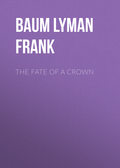
Лаймен Фрэнк Баум
Annabel
CHAPTER XVIII
WILL’S BEST GIRL
Man’s justice is helpless to punish adequately such crimes as Ezra Jordan had been guilty of, and John Carden was so grateful for the final restoration of his beloved wife and children that he was not disposed to prosecute legally the false friend who had been responsible for his years of anguish.
“Let us leave this criminal to a Judgment surer and mightier than ours,” he said, and the others acquiesced in his decision.
But in the stormy interview that followed Mr. Williams stipulated that Jordan, as a price of his personal freedom, should refund to John Carden every penny of that vast sum of money of which he had so treacherously defrauded him, and although it was worse than death to the miser to disgorge his ill-gotten gains, he was forced to agree to the proposition.
This being settled, Will was called upon for explanation, and related the strange story of his finding his father in London. Mr. Carden followed with a brief outline of his successful career in Birmingham, where his wonderful process had made for him a great fortune and a respected name.
The conference being now ended, Will and his father hurried away to meet the mother and wife, who was as yet ignorant of the glad surprise awaiting her. For father and son had gone straight to the office of the steel works from the station, delaying only long enough to place Mrs. Williams in the carriage that had been sent to whirl her home to the waiting arms of her eager children.
As for Mr. Jordan, he was turned over to the mercies of the commercial traveller and the little detective in plain clothes, who would see he did not escape until he had fulfilled his obligation of refunding his fortune to John Carden.
When Will and his father neared the cottage the boy went on ahead to prepare his mother for the great surprise, and after she had clasped him in her arms and hugged the boy to her heart’s content, (with Flo dancing merrily around and Egbert smiling his pleasure at his brother’s return,) he said to her earnestly:
“Mother, Mr. Jordan has been discovered to be a very wicked man.”
“Oh, I’m sorry to hear that,” she exclaimed; “what has he done?”
“Why, he’s robbed father, for one thing, by stealing his secret and selling it; and besides he tried to make us all believe father was dead.”
She gave a sudden cry, at this, and clasped her hands above her heart. Then, reading his face with questioning eyes, she managed to say:
“Speak, Will! What do you mean?”
“Why, father wasn’t lost at sea at all. He’s been in Birmingham all this time.”
She swayed for an instant, as if about to fall. Then, drawing herself tense, she said:
“If this is true, why did he never write to us? Why has he been silent so long?”
“Because Mr. Jordan made him believe we were dead, too, and poor father has been mourning for us all these years.”
“I – I don’t understand,” she murmured, brokenly. “How do you know all this, my son?”
“Father told me. I met him in London, and he came back with me.”
A light seemed to break upon her, glorifying her worn face.
“Where is he, Will?”
“Here!” said a new voice, and John Carden stepped within the door and held out his arms.
She fainted then, which was a very natural thing to do under such trying circumstances; but when she regained consciousness she lay happily within her husband’s close embrace, and now Will seized the staring Flo by one hand and the confused Egbert by the other, and led them softly from the room.
Great was the excitement in Bingham when the news of John Carden’s return flew from lip to lip, together with the dreadful tale of Mr. Jordan’s wickedness. When the latter had made restitution and slunk away to some unknown part of the country, there was none to regret his loss, but many willing to declare they had always mistrusted him. Scores of citizens flocked to congratulate Mr. Carden and his wife, and the poor woman was happier than she had ever been since the days when her handsome and talented husband had first led her to the altar.
The two steel magnates talked over their business complications together, and decided to form a partnership, continuing the manufacture of the Carden Process Steel both in Bingham and in Birmingham, and thus controlling the industry on both sides of the ocean.
And Mrs. Williams gave a big dinner to celebrate this important event, and kissed Mrs. Carden very sweetly when she arrived upon the arm of her distinguished husband. And Nora, so happy that she had to pause frequently to wipe away the tears that gathered in her kindly eyes, quite outdid herself in the preparation of the feast.
“Glory be!” she said to the imperturbable Thomas, “The Cardens, God bless ’em! have come to their own again.”
Will and Annabel sat side by side at the table, smiling and contented at being together. Even Reginald was on his good behavior, and Gladys, who had conceived a violent love for her mother since that lady’s return, was demure and silent. Flo sat next to Theodore, and Mary Louise was beside Egbert, to whom, being pitiful of his deficiencies, she was very attentive.
Merrier comrades were never seated at one table, and Will was the hero of the hour. Mr. Williams made a neat speech, at dessert, praising the boy so highly that his cheeks grew as red as cherries. Said he:
“We owe to Will the discovery of Mr. Carden – ”
“Oh, no,” cried Will. “We owe that to Mrs. Williams.”
“And the dress suit,” added his father, with a smile and a proud glance at his son.
“And we owe to Will the discovery of the papers in the oak tree,” continued Mr. Williams.
“Why, that was Annabel!” said Will.
“Anyhow,” declared the doctor, who, with his napkin tucked under his chin, was supremely happy, “we owe to Will those famous mushrooms we have just eaten.”
“Oh, Doctor!” remonstrated Will. “You’re the head of the firm, and I’ve no doubt you sold them to Nora at a big profit.”
They all laughed, then; but they were glad to laugh at the slightest excuse to be merry. And it was an evening they all remembered as long as they lived.
Having made such satisfactory arrangements with Mr. Williams to continue the business at Bingham, Mr. Carden prepared to return to Birmingham, taking with him Mrs. Carden and Flo and Egbert. For the scene of his prosperity was to become his future home. It was arranged that Will should remain in America and attend college, after which he was promised Mr. Jordan’s place as secretary at the Bingham mills, in order that he might represent his father’s American interests.
“We’re going to be partners, some day, my boy,” said Mr. Williams, slapping Will’s shoulder with characteristic heartiness; “so hurry through college, and get ready for work. And remember that every vacation you are to come straight to my home.”
Of course Will was very happy at this prospect; and, because he must enter Princeton in September, he devoted most of the days that remained to him in driving or walking with Annabel.
One afternoon they met the doctor striding down the road with his stout cane in one hand and his medicine case in the other.
He halted before Annabel and Will, scowling dreadfully.
“What’s this I hear about your going to college?” he asked the boy.
“It’s true.” said Will, smiling. “I’m afraid, Doctor, I’ll have to give up growing mushrooms.”
“You will, eh? Well, sir, what’s going to become of those poor grandchildren of mine?” growled the doctor.
“If they are ever in need, sir, I’ll agree to support them.”
“In that event, we’ll dissolve partnership,” said the old fellow, less gruffly. Then he added:
“Put out your tongue!”
“What for?” asked Will
“You’ve got symptoms.”
“Oh what?”
“A disease that’s mighty common,” declared the other, with an amused laugh at his own pleasantry; “but one that seldom proves fatal.”
“I don’t know what you mean,” said the boy, with downcast eyes.
Dr. Meigs turned suddenly to Annabel, chucking her playfully underneath her chin before she could draw back.
“Aren’t you in this young lady’s company pretty often these days?”
Will straightened perceptibly, plainly showing his confusion. He glanced shyly at Annabel who stood with downcast eyes, her face suffused with blushes, then he blurted out:
“Of course I am. Annabel’s an old chum.”





